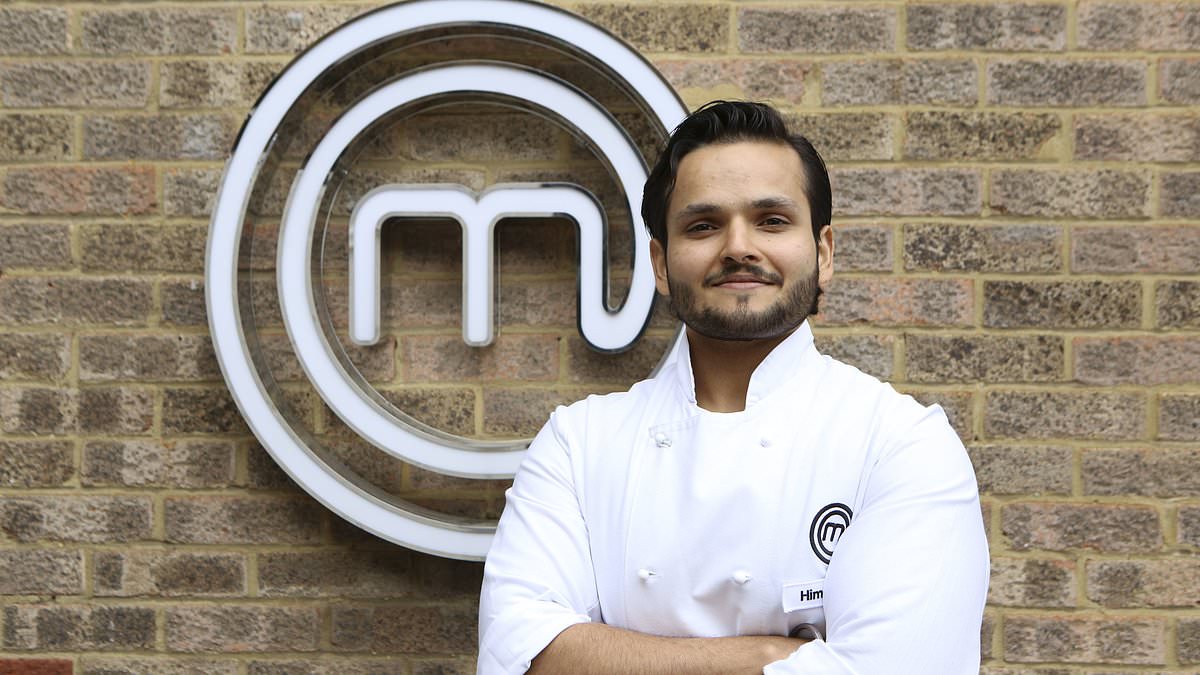Masterchef: The Professionals
Rating:
Ukraine’s Stolen Children
Rating:
The French gourmet and wine connoisseur Andre Simon had a theory about the British and food. We never learned to appreciate it, he said, because forks weren’t introduced until the reign of James I.
Diplomat and wartime MP Harold Nicolson had a different idea. While the British working man has a highly sensitive palate that can instantly tell if a pint of beer isn’t quite right, he doesn’t care about haute cuisine because he’s generally just ravenous.
A chap who has worked up a vigorous appetite will have no truck with cordon bleu, Harold believed: ‘It was only when appetites became jaded that the art of cooking began.’
Gregg Wallace took one look at chef Himanshu’s (pictured) lamb and declared, ‘That is not cooked anywhere near enough for me. I would send it back, I’m afraid.’ Himanshu appeared on the verge of tears
Apart from the fare, the chief problem with MasterChef: The Professionals is its monotonous format. Pictured, Marcus Wareing, Monica Galetti and Gregg Wallace
This was why fancy cooking was the delight of decadent peoples, like the Ancient Romans… or the French.
If that’s true, we must be a decadent lot today. MasterChef: The Professionals (BBC1) took the basics of good plain cooking — a lamb chop, a piece of mackerel, a turnip — and turned them into dishes of farcical fussiness.
Judge Monica Galetti, returning to the show, showed us for the first challenge how she wanted to see the contestants filleting a flat fish, and then drizzled it in a bizarre concoction of coconut milk and alcohol.
On the plate, it looked less like a fish supper, more like something out of a Christmas cracker.
Apart from the fare, the chief problem with MasterChef: The Professionals is its monotonous format.
We see one of the judges, either Monica or Marcus Wareing, demonstrate a dish.
Then one candidate after another tries to replicate it, until it’s about as appetising as beans on toast every night of the week.
The show has none of the fun, flair or silliness of its Channel 4 rival, Bake Off: The Professionals.
In the second round, preparing a ‘signature dish’, one young chef from a Highlands hotel served up a sort of Chinese spring roll that was in fact a ‘crispy haggis’, followed by a whisky panna cotta.
Teenagers rounded up in the occupied cities of Mariupol and Kherson last year were sent to ‘holiday camps’ in Crimea to be fattened up for a few weeks. Pictured, 14-year-old Danil with his mother Alla in ITV1’s Ukraine’s Stolen Children
This heartbreaking film followed a handful of brave, desperate mothers who risked their lives by venturing into Russia and demanding their children back. Pictured, Olga Hurulya travels to Russia in search of her godson Denis Shahida
Another presented a version of a traditional Swedish recipe with boiled eggs, potatoes and pickled herring, called Old Man’s Mix, and ended up with (wait for it) ‘salad cream flavoured herring sauce’.
Given that it all looks dubious, bordering on inedible, the judges have harsh standards.
Gregg Wallace took one look at chef Himanshu’s lamb and declared, ‘That is not cooked anywhere near enough for me. I would send it back, I’m afraid.’
Himanshu appeared on the verge of tears. I hope someone took him to one side afterwards and assured him that, in an ordinary cafe, and not some ludicrously expensive bistro with Michelin pretensions, there was nothing wrong with his lamb chop that a shovelful of chips and half a pint of Bisto couldn’t fix.
Good plain cooking and lots of it was one of the ploys used by Russia to stage a propaganda coup, revealed in the war documentary Ukraine’s Stolen Children (ITV1).
Teenagers rounded up in the occupied cities of Mariupol and Kherson last year were sent to ‘holiday camps’ in Crimea to be fattened up for a few weeks.
Then they were urged to turn their backs on their families, and forced to appear in videos for social media, telling the world how grateful they were to the invaders and Vladimir Putin.
Many were promised homes and money to stay — and told lies that, if they returned to their homes in Ukraine, they would be shot as traitors.
This heartbreaking film followed a handful of brave, desperate mothers who risked their lives by venturing into Russia and demanding their children back. So far, fewer than 400 have been returned.
